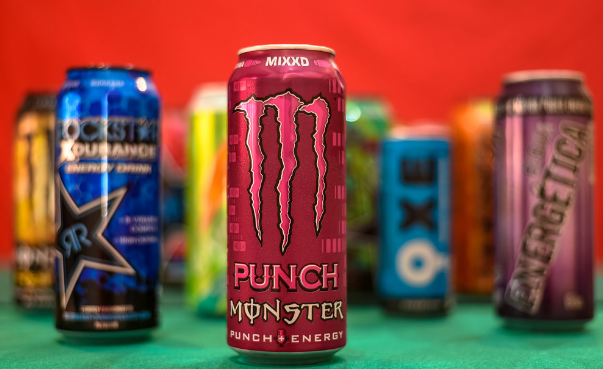In the past 20 years, energy drinks have become very popular, especially among teens, athletes, and students in need of a fast-acting burst of energy. These beverages are marketed to improve mental alertness, anaerobic performance, and endurance, but what about all of the side effects that aren’t listed on the back of your favorite energy drink?
Common ingredients found in energy drinks and what they mean: For starters, energy drinks typically contain high amounts of caffeine that act as a major part of the boost of energy you normally get after drinking an energy drink. A lesser-known name found on the ingredient list of energy drinks is taurine. Taurine is an amino acid (amino acids are molecules that combine to form proteins) that helps with energy production. Finally, the third most common ingredient in energy drinks is guarana. Guarana is a plant found most commonly in Brazil, that contains high amounts of caffeine. Guarana is used to relieve pain and suppress appetite and thirst.
Despite the popularity of energy drinks, there are definitely some controversial opinions on whether people should actually be drinking them due to the health issues that they potentially cause. For example, in December 2011, a 14-year-old girl died of a heart attack after drinking two cans of high-caffeine Monster Energy drinks on the same day. However, it was proven that the girl had a pre-existing heart disease and that the 2 cans of Monster energy drinks did not cause her death. After she had passed, her family requested an autopsy. After conducting the autopsy, the medical examiner found that she had a heart disease that she had been receiving treatment for over the past few years. The death of Anais Fournier was not caused by drinking the 2 energy drinks, but the loss of her life has impacted so many people around us.
Ever since the very first energy drink was invented in 1962, many people have wondered if energy drinks are better than coffee for our health. While some energy drinks contain less sugar than some coffee drinks, energy drinks contain primarily synthetic caffeine which is made and produced in a lab, while coffee and drinks made with coffee contain natural caffeine derived from plants. Not only is the caffeine in coffee healthier, but coffee is also cheaper. While the average cup of black coffee is approximately 2-3 dollars, energy drinks are priced more expensive at anywhere from 2-5 dollars.
What do professional sports coaches think about their athletes drinking energy drinks? While there are no outright bans on energy drinks at the professional level, there are some at the NCAA level. For example, no athlete who plays an NCAA sport can consume 500 mg of caffeine or more within 2-3 hours before an athletic event.
All in all, energy drinks have no health benefits and can cause insomnia, heart issues, anxiety, and dehydration. However, it is definitely a personal choice when it comes to deciding whether to drink energy drinks or not. No matter what, they should always be consumed in moderation, and anybody drinking them should be aware of the risks before drinking them.

























































































































